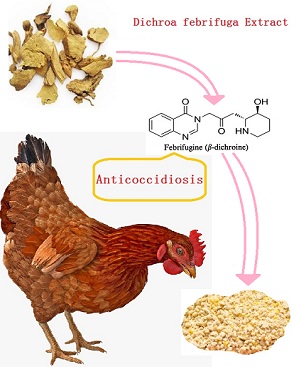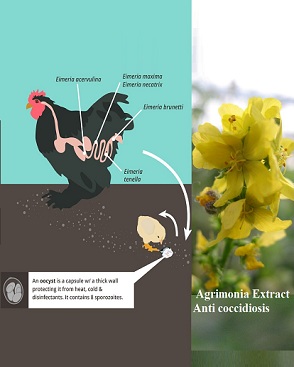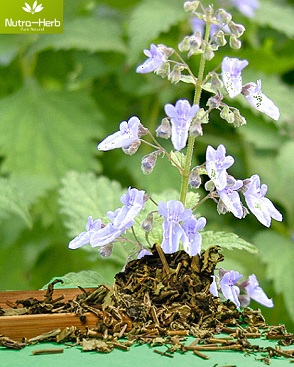- Plant-Based Protein
- Natural Plant Flavours
- Food and Dietary Supplement Ingredients
- Fruit Juice Powder
- Animal Nutrition Ingredients
- Water Soluble Ingredients
- Cosmetic Ingredients
- Unveiling the Therapeutic Potential of Rabdosia Rubescens: A Comprehensive Review
- What are the medicinal properties of Rabdosia Rubescens?
- Nutritional value of Orange Juice Powder compared to fresh orange juice.
- Processing Conditions and Nutritional Value of Orange Juice Powder
- Exploring the Versatility of Herbal Extracts in Food Flavors
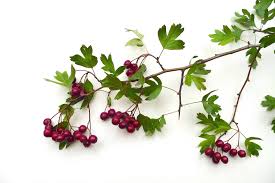
What are the health benefits of hawthorn leaf?
Welcome to our blog! Today, we are diving into the world of hawthorn leaf and uncovering its incredible health benefits. Whether you're a fan of herbal remedies or simply curious about natural alternatives, hawthorn leaf is definitely worth exploring.


Prunus mume extract, Antimicrobial, Anticoccidial, Anti-bursal disease, livestock and poultry
Prunus mume extract (Chinese black plum) was a potential candidate for developing an antimicrobial agent to control or inhibit Helicobacter pylori, associated with gastritis and gastric ulcers and several pathogenic bacteria,like Escherichia coli, Shigella, typhoid, paratyphoid, cholera, pertussis, proteus, anthrax, diphtheria, diphtheroid, meningitis, Staphylococcus aureus, pneumococcus, hemolytic streptococcus. It has effects on pandemic influenza A (H1N1) virus. And also has good anticoccidial effect.It has therapeutic Efficacy of Fructus Mume Extract Against Infectious Bursal Disease in Chickens. It is also used for killing parasitic Ascaris in human and animals.Fuctus Mume extract can be used as a natural plant antibiotic in poultry breeding.
Background:
A broad number of feed additives, including antibiotics, have been extensively used in the poultry industry since the 1950’s. It has been reported that up to approximately 80% of food animals have received synthetic substances for the purpose of either growth promotion or medication. However, recent concerns about feasible antibiotic residues and resistance of pathogenic bacteria have brought much a great attention to the use of antibiotics in food animals. Thus, an enormous effort has been made to search for alternatives to antibiotics as growth promoters in animal agriculture. The ban on the use of antibiotics in food animals in the European Union (EU) has especially accelerated the study of alternative feed additives to antibiotics. As one category of alternatives, natural compounds and extracts originated from plants have been extensively investigated as feed additives to substitute dietary antibiotics for improving growth performance under an intensive poultry production system.
The Chinese black plum (Prunus mume Siebold and Zucc.), its common names including Chinese plum and Japanese apricot, has long been used as a traditional medicinal and healthy functional food in China,Japan and Korea to treat enteric disorder or improve digestion in humans. Recent studies indicated that the Prunus mume extract was a potential candidate for developing an antimicrobial agent to control or inhibit Helicobacter pylori, associated with gastritis and gastric ulcers and several pathogenic bacteria,like Escherichia coli, Shigella, typhoid, paratyphoid, cholera, pertussis, proteus, anthrax, diphtheria, diphtheroid, meningitis, Staphylococcus aureus, pneumococcus, hemolytic streptococcus. It has effects on pandemic influenza A (H1N1) virus. And also has good anticoccidial effect.It has therapeutic Efficacy of Fructus Mume Extract Against Infectious Bursal Disease in Chickens. It is also used for killing parasitic Ascaris in human and animals.Fuctus Mume extract can be used as a natural plant antibiotic in poultry breeding.
What you may get from us: If you're developing a feed additive that contains traditional Chinese medicine of Fructus Mume (Prunus mume Siebold and Zucc.).I think you can find the information or products you need here.
Simple production process in our factory: After the plant is collected, It can be made straight powder. Or the raw material will be processed by solvent extraction, separation and purification, filtration, concentration, drying and other steps to form the final products. We may also design a prouction process based on your special requirements.
Through the physical and chemical processes, those compunds you don't want was removed, and the compunds preferred was accumulated. Which make the products achieve the best effects.
|
Fructus mume Straight powder or Fructus mume Extract |
||
|
Appearance |
Powder |
|
|
Color |
Brown |
|
|
Partical size |
Normally pass through 60mesh |
|
|
Pack size |
25 kg per paper drum |
|
|
Purity of active compunds |
10-20%Organic acid |
By Titration |
|
For pricing or more information, please call 86 29 88444632 or send an email to Sales@nutraherbsource.com.
|
||
General Information
Latin Name:Prunus mume Siebold and Zucc.
Common Name:Wumei, Ume,Chinese plum,Dark plum,Black plum,Chinese black plum,Fructus mume.Fructus prunus.Mume fruit, Omae,Smoked plum.Fructus mume,Rosaceae plum, Japanese apricot.
What is Chinese Black Plum and the Preparation description:
Prunus mume is the dry and immature fruit of Rosaceae plum. In May, the riping green fruits (Prunus Mume) were picked and separated according to the size. They were baked separately. The fire power should not be too large, and the temperature should be kept at about 40 ℃. When the plum is baked to 60% dry, it must be turned up and down (do not break the skin) to make it dry evenly. Generally, the Kang is baked for 2-3 days and nights until the flesh is yellow brown and wrinkled. After baking, it is braised for 2-3 days, and then it becomes black.
Plant description
Medicinally it refers to the nearly ripe fruits of Prunus mume Sieb. et Zucc. This is a species in the family Rosaceae. Other common names include ume, meizi, maesil, mume, umeboshi, Mume fruit, Black Plum, Fructus Mume, Ume Plum Fruit, and more. In China it is primarily produced in Zhejiang, Fujian, and Yunnan. The fruits are collected in summer when they are nearly ripe. And then they are baked at a low temp and covered tightly until they are wrinkled and black. Medicinally it is used pit-removed, raw or carbonized by stir-frying.
Prunus mume tree is a member in the Armeniaca part of the genus Prunus. It is such a distinct tree species because it is between apricot and the plum trees. However, botanically it is considered much closer to the apricot rather than the plum even though it is named after it. This is a small deciduous tree that can be up to 10 meters high, with pale gray bark, slender twigs, alternate leaves, elliptic ovate blade, white or pink aromatic flowers, and nearly spherical fruits. Its flowers (meihua) are known to the west as “plum blossom” or “flowering plum.” This flower is favored by many people and given special meanings in poems because of its early blossom and defying snow.
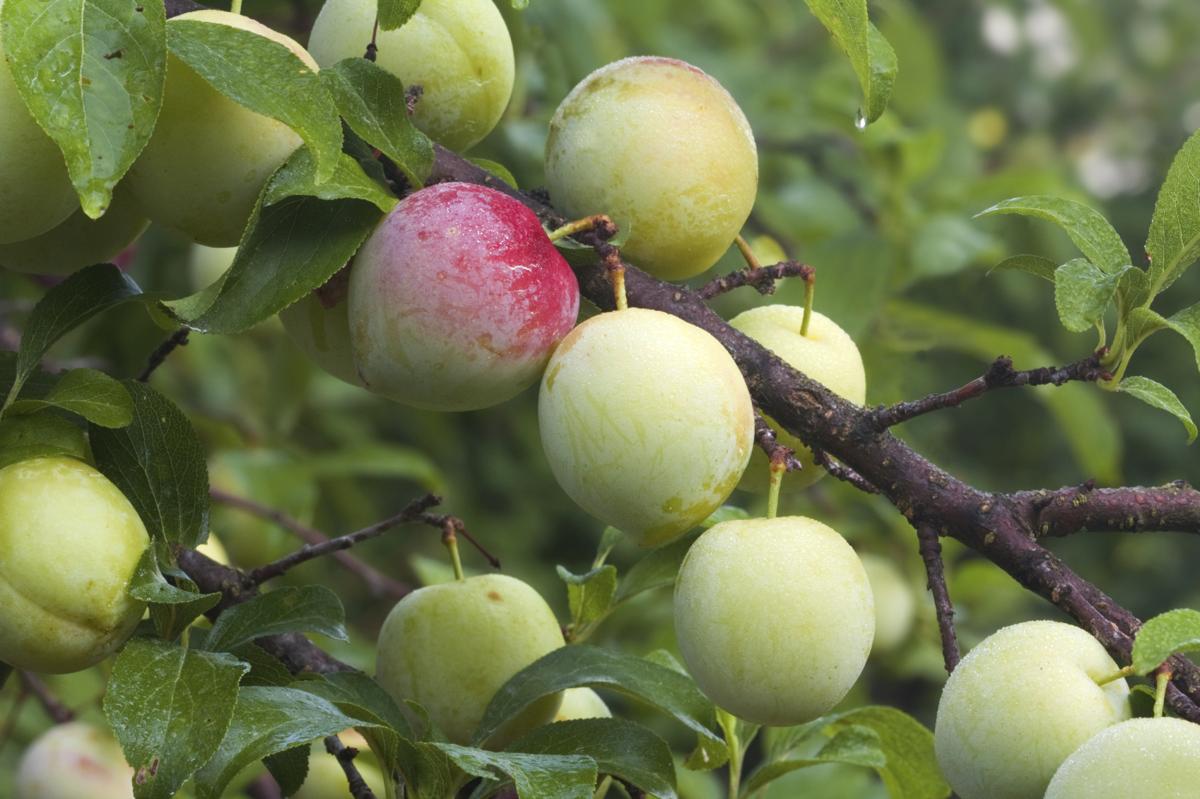
Chemical Constituents of Prunus mume
The Prunus mume fruit contains citric acid, malic acid, oxalic acid, succinic acid and fumaric acid with total acid content of 4% - 5.5%. The former two kinds of organic acids are more. It also contains 5-hydroxymethyl-2-furfural (5-hydroxymethyl-2-furaldehyde), which is colorless oil. The main volatile components are benzaldehyde (62.40%), terpinen-4-ol (3.97%), benzyl alcohol (3.97%) and hexadecanoic acid (4.55%). The content of Amygdalin in Fructus Mume is about 0.5%, while that in Fructus Mume is about 4.3%. In addition, picric acid and superoxide dismutase (SOD) were also reported in Prunus mume.
Modern pharmacological actions of Chinese plums decoction
1) It is proved with inhibition on a variety of pathogenic bacteria and skin fungi in vitro;
2) It can inhibit the movement of isolated rabbit intestine;
3) It has mild contraction to the gallbladder, which can promote the bile secretion;
4) In vitro it inhibits roundworms;
5) It antagonizes milk-induced allergic reaction and histamine shock. But it is with no antagonism to histamine-induced asthma;
6) It can enhance immune function.
The health effect of Amla ( Emblica officinali) in poultry and livestock Flock
Anti-inflammatory and anti-oxidative agent.
Inflammation and oxidation may cause serious diseases, and Chinese black plum extract could be a key compound for treatment. Chinese black Plum contains triterpenoids; these compounds exert anti-inflammatory and anti-oxidative effects that protect the liver in both animal models and clinical trial. The mechanism of anti-inflammatory and antioxidative effects are described like high-mobility group box 1 protein plays a major role in numerous inflammatory disorders such as sepsis.An extract of ume (Chinese black Plum ) is a great source of triterpenoids that strongly suppresses High-mobility group box 1 protein. For these reasons, ume (Chinese black Plum ) extracts work as an anti- inflammatory and anti-oxidative agent.Several triterpenoids in ume extract, such as oleanolic acid and ursolic acid, may have both anti-inflammatory effects and anti-cancer effects.
Antibacterial and antibacterial effect
Wumei and its preparation can inhibit Escherichia coli, Shigella, typhoid, paratyphoid, cholera, pertussis, proteus, anthrax, diphtheria, diphtheroid, meningitis, Staphylococcus aureus, pneumococcus, hemolytic streptococcus, human tuberculosis and Pseudomonas aeruginosa in vitro In addition, it can also inhibit fungi such as Trichophyton cangxu. It has a strong effect on Staphylococcus, Bacillus subtilis, Escherichia coli and typhoid bacilli. Among them, the quantitative report of inhibition effect on Staphylococcus aureus is: MIC 50 is 1:320, MIC 90 is 1:160. In the study of antibacterial mechanism of Prunus mume, some people think that most pathogens grow best in the range of p6h. O-8.0, with high enzyme activity and vigorous growth and reproduction. If they are placed in the environment with pH less than 4, most pathogens are difficult to survive. In vitro bacteriostatic experiment also confirmed that the inhibitory effect of organic acid contained in Prunus mume is indeed stronger than that of organic acid salt, but from the perspective of the overall effect of the aqueous solution of Prunus mume, the total acidity of Prunus mume is only one aspect of the effect of bacteriostatic effect, and there may be other chemical components in coordination, such as 5-light-2-furfural, picric acid, etc.
In vitro screening of antiviral biological effects showed that mume had inhibitory effects on a variety of pathogenic bacteria, such as Shigella, Escherichia coli, typhoid bacillus, paratyphoid bacillus, pertussis bacillus, meningococci, etc. It also has inhibitory effect on Mycobacterium tuberculosis, which may be related to citric acid and malic acid. It can also inhibit some pathogenic fungi, such as tinea versicolor, Trichophyton flocculus and small gypsum like spores.
Inhibitory effect on pandemic influenza A (H1N1) virus.
Some components parts were concentrated from Chinese black plum and examined their inhibitory activities against the novel influenza A (H1N1) pandemic virus. The result showed that Chinese black Plum extract worked most effectively as an anti-sialidase and anti-hemagglutination agent. The results suggest that Chinese black Plum might be a kind of compounds for the development of an influenza A inhibitor. It not only improves blood fluidity, but may also reduce influenza A infection.
Immunomodulatory effect of dietary Chinese black plum extract on Coccidiosis
A study was conducted to evaluate the effect of dietary supplementation with a Chinese black plum extract on host protective immune responses against avian coccidiosis, the most economically important parasitic disease of poultry. One-day-old White Leghorn chickens were fed from the time of hatch with a standard diet either without Chinese black plum extract (control and P 0 groups) or supplemented with Chinese black plum extract at 0.5% (P 0.5) or 1.0% (P 1.0) of the diet. Animals in the P 0, P 0.5, and P 1.0 groups were orally challenged with 5000 sporulated oocysts of Eimeria acervulina at day 12 post-hatch, while control animals were uninfected. Dietary supplementation of plums increased body weight gain, reduced fecal oocyst shedding, and increased the levels of mRNAs for interferon-gamma and interleukin-15 in the P 1.0 group at 10 days post-infection compared with the P 0 group. Furthermore, chickens fed either the P 0.5 or P 1.0 diets exhibited significantly greater spleen cell proliferation compared with the non-Chinese black plum extract P 0 group. These results indicate that Chinese black plum extract possesses immune enhancing properties, and that feeding chickens a plum-supplemented diet augments protective immunity against coccidiosis.
Plum promotes protective immunity against coccidiosis as assessed by reduced body weight loss, decreased oocyst shedding, enhanced splenocyte proliferation, and elevated expression of transcripts encoding IFN and IL-15.
Continuous ingestion of Probiotic Fermented Four-Herb Combination (Curcuma longa, Houttuynia cordata, Prunus mume and Rubus coreanus) markedly increased lysozyme activity in serum and the spleen, peripheral blood mononuclear cell (PBMC) proliferation, the CD4+:CD8+ T-lymphocyte ratio in the spleen, and antibody production level in broiler chicks.
Wumei can be used as a plant antibiotic in poultry breeding
Study shows Chines balck plum (Prunus mume Siebold and Zucc.,) products affect growth performance, digestive enzymes, enteric microflora and inflammatory cytokines in growing broiler chicks. A total of one hundred twenty eight, 3-d-old broiler chicks were assigned to a basal diet and a basal diet supplemented with antibiotics, freeze-dried Prunus mume powder ( 0.25%) and Prunus mume extract ( 0.125%) until 35 days of age. Throughout the entire feeding period (3-35 days), there were no differences in body weight, feed intake, total gain and feed to gain ratio among the birds fed the basal diet and those fed the diet supplemented with antibiotics, either Prunus mume powder or extract. The specific activities of pancreatic α-amylase and trypsin significantly increased (P<0.05) in birds fed the Prunus mume extract diet compared with those fed the basal diet and antibiotics diets. However, the specific activities of intestinal hydrolases such as maltase, sucrase and leucine aminopeptidase were not affected by the dietary groups. The colony forming units (CFU) of E. coli in the digesta of ileo-cecum in the Prunus mume powder and Prunus mume extract groups were similar to those in the antibiotics group. The CFU of lactobacilli in the Prunus mume powder and Prunus mume extract groups was significantly greater (P<0.05) than that in the antibiotics group, although there was no difference between the Prunus mume powder and Prunus mume extract groups. The mRNA expression of splenic IL-1β and IL-6, pro-inflammatory cytokines, was significantly higher (P<0.05) in the Prunus mume extract group than in the basal diet group without affecting thymic cytokines. In summary, the dietary Prunus mume extract showed beneficial effects on pancreatic digestive enzymes, enteric microflora population and inflammatory cytokine mRNA expression, suggesting that Prunus mume extract might be a potential candidate as an alternative to antibiotics in birds.
Effect on killing parasitic Ascaris
The effect of Wumei on Ascaris lumbricoides has the function of exciting and stimulating Ascaris lumbricoides to retreat. For example, the activity of Ascaris lumbricoides can be enhanced by adding Wumei Decoction into 1% salt water and 0.1% sodium bicarbonate solution containing Ascaris lumbricoides. In the anaerobic condition, the Ascaris lumbricoides was put into a 0.3-0.5cm diameter rubber tube, the rubber tube was put into a 38 ℃ water basin, and the collected bile was dripped into the tube from the head end of the Ascaris lumbricoides. The results showed that most of the Ascaris lumbricoides retreated from the tube, and some of the Ascaris lumbricoides head retreated from the tube. It has also been reported that the extract of 223 kinds of traditional Chinese medicine by hot water is effective in vitro.
Therapeutic Efficacy of Fructus Mume Extract Against Infectious Bursal Disease in Chickens
Currently, infectious bursal disease is a highly contagious disease leading to huge economic losses in poultry industry. Fructus mume extract has therapeutic effects against infectious bursal disease virus infection.Chickens were inoculated intranasally with 0.2 ml of 102.5 EID50 of infectious bursal disease virus strain CJ801. Twenty-four hours post infection, the birds were orally administered with 400, 200 and 100 mg/kg Fructus mume extract, respectively, for 5 days and then monitored daily for 10 days. Finally, the remaining birds were euthanized to collect the sera for detecting antibodies and immune organs for determining the immune organs index as well as virus loads. The Fructus mume extract improved survival rate and relative body gain rate. Virus loads in bursa of Fabricius in Fructus mume extract treated groups decreased significantly while higher antibody levels were detected in the Fructus mume extract groups. These results implied that chickens administered with 100-200 mg/kg of Fructus mume extract for 5 days could improve protection against infectious bursal disease virus infection. Fructus mume extract extracts might involve the protection of B cells in the bursa of Fabricius and induce higher antibody levels post infectious bursal disease virus infection.Fructus mume extract might be a promising substance against infectious bursal disease virus in the poultry industry.
- Prev:Nutrappetite-1,Herbal formula,Improve Growth Performance and Feed Conversion of Poultry
- Next:Pomegranate,Punica granatum,Antibacterial,Anticoccidial effect in livestock and poultry



